2017 年 11 月翻译资格考试二级英语笔译实务真题及答案
Section 1 English-Chinese Translation (50 points)
Translate the following two passages into Chinese.
Passage 1
You’ve temporarily misplaced your cell phone and anxiously retrace your steps to
try to find it. Or perhaps you never let go of your phone—it’s always in your hand,
your pocket, or your bag, ready to be answered or consulted at a moment’s notice.
When new models come out, you feel bad about saying goodbye to your electronic pal.
And when your battery life runs down at the end of the day, you feel that yours is
running low as well. New research shows that there’s a psychological reason for
such extreme phone dependence: According to the attachment theory perspective, for
some of us, our phone serves the same function as the teddy bear we clung to in
childhood.
Attachment theory proposes that our early life experiences with the major figures
responsible for our well-being, namely parents or other caregivers, are at the root
of our connections to the adults with whom we form close relationships. Importantly,
attachment in early life can extend to inanimate objects. Teddy bears, for example,
serve as what the attachment theorist D.W. Winnicott calls “transitional objects.”
The teddy bear, unlike the parent, is always there. When children can’t be with
their parents, they can still be with their teddy bear. These stuffed animals also
serve as a transition between dependence and independence when young children begin
to develop a separate sense of self. We extend our dependence on caregivers to these
animals, and use them to help us move to greater autonomy and an independent sense
of self.
A cell phone has the potential to be a “compensatory attachment” object. Although
phones are often castigated for their addictive potential, scientists cite evidence
that supports the idea that “healthy, well-functioning adults also report
significant emotional attachment to special objects”.
Indeed, cell phones have become a pervasive feature of our lives: The number of cell
phone subscriptions exceeds the total population of the planet. The average amount
of mobile or smartphone use in the U.S. is 3.3 hours per day; young adults (ages
18 to 24) report 5.2 hours on an average day. People also like to be near their phones:
A 2013 survey reports that 79 percent of users keep their phones with them for all
but two of their waking hours. Nearly as many people report being distressed when
they’re separated from their phone.
参考译文:
�
你有过这种经历吗?手机一时放错了地方,忘了在哪,急急忙忙返回寻找;手机从不离身,
总是握在手里,揣在兜里或者放在包里,时刻准备回复消息,查找内容。一整天过去了,一
旦发现手机没电,简直觉得自己也要没电了。最新研究揭示了极端“手机依赖症”背后的心
理动因:根据依恋理论,手机简直成了我们大多数人小时候恋恋不舍的泰迪熊。
依恋理论认为,儿童自幼是否在父母的呵护下健康成长,这种相处体验构成了其日后与其他
成年人建立亲密关系的基础。更为重要的是,幼年的依恋心理,还可能转移到物体上去,泰
迪熊就是一个典型例子。泰迪熊与父母的区别在于,它会一直在陪你身边。儿童把对父母的
依赖心理延伸到毛绒玩具身上,由此建立起自我独立意识。
手机也可能成为这种“依恋替代品”。尽管手机经常因为致人上瘾而备受诟病,科学家还是
援引了相关证据来支持这样一种观点:“身心健康的正常成年人也会对特殊物品产生强烈的
情感依恋”。
毫无疑问,手机在生活中无处不在:全球手机用户数量已超过全球总人口。美国人平均每天
使用移动电话或智能手机的时间为 3.3 小时。手机的优点显而易见:可以随身携带,还能方
便与自己关心的人保持联系。就算无法与朋友、恋人、家人直接通话,至少手机里的照片、
短信能让你觉得他们近在咫尺。你也可以关注他们的社交媒体账号,不仅能实时了解其状态,
还能回顾过去与之相处的难忘瞬间。所有这些,都足以让你“不那么孤单”。
Passage 2
Many countries have adopted the principle of sustainable development, it can combat
environment deterioration in air quality, water quality and production in developing
countries. Health education serves as a viable role for every member in the world.
But some argue that it’s a vague idea, some organizations may use it in its own
interests, whether environmental or economic is the nature of interests. Others
argue that sustainable development in developing countries overlook the local
customs, habitude and people.
Whereas interdependence is desirable during times of peace, war necessitates
competition and independence. Tariffs and importation limits strengthen a
country’s economic vitality while potentially weakening the economies of its
enemies. Moreover, protectionism in the weapons industry is highly desirable during
such circumstances because reliance on another state for armaments can be fatal.
For the most part, economists emphasize the negative effects of protectionism. It
reduces international trade and raises prices for consumers. In addition, domestic
firms that receive protection have less incentive to innovate. Although free trade
puts uncompetitive firms out of business, the displaced workers and resources are
ultimately allocated to other areas of the economy.
Imposing quotas is a method used to protect trade, since foreign companies cannot
�
ship more products regardless of how low they set their prices. Countries that hope
to help a new industry thrive locally often impose quotas on imported goods. They
believe that such restrictions allow entities in the new industry to develop their
own competitive advantages and produce the products efficiently. Developing
countries often use this argument to justify their restrictions on foreign goods.
Protectionism’s purpose is usually to create jobs for domestic workers. Companies
that operate in industries protected by quotas hire workers locally. Another
disadvantage of quotas is the reduction in the quality of products in the absence
of competition from foreign companies. Without competition, local firms are less
likely to invest in innovation and improve their products and services. Domestic
sellers don’t have an incentive to enhance efficiency and lower their prices, and
under such conditions, consumers eventually pay more for products and services they
could receive from foreign competitors. As local companies lose competitiveness,
they become pressured to outsource jobs. In the long run, increasing protectionism
commonly leads to layoffs and economic slowdown.
参考译文:
为应对广大发展中国家所面临的环境恶化问题,保障空气质量、水质和生产安全,许多国家
纷纷制定可持续发展战略。实践证明,卫生教育对推动世界各国的发展具有切实可行性。但
有人认为,可持续发展的概念不够明晰,沦为部分组织谋取自身利益的工具,置环境或经济
负面效应于不顾。还有人认为,发展中国家在实施可持续发展战略过程中,时常忽略民风、
民俗和民生问题。
在和平年代,各国之间相互依存、共谋发展,战争时期,各国又相互竞争,追求独立。关税
和进口限制政策有助于增强本国经济活力,同时削弱敌国的经济增长潜力。再者,战争时期,
武器制造行业采取保护主义,可避免对外过度依赖,保护本国免遭受致命打击。
经济学家多半强调保护主义的负面效应,认为保护主义不仅削弱了国际贸易,还抬升了消费
价格。不仅如此,在贸易保护伞下受到恩荫的本土企业往往因此丧失了创新动力。在自由贸
易的浪潮下,尽管缺乏竞争力的公司多以破产收场,但因此失业的工人和闲置的资源,依然
可以在其他经济领域找到用武之地。
设定限额是贸易保护方式的一种,在此情况下,不论商品定价多低,国外企业得以进驻市场
的产品数量始终有限。各国通常会对进口产品采取限额政策,以推动本国新兴产业的发展。
经济学家认为,此类限制政策有助于新兴产业实体充分提升自身竞争力及商品生产效率。
贸易主义政策通常旨在创造本土就业岗位。受益于限额政策的业内公司通常只雇佣当地工
人。限额消除了外国对手的竞争压力,致使国内产品的质量有所下降,这是限额政策的另一
缺点。缺少竞争对手的刺激,本土企业往往不再大力投入创新,产品与服务质量也会大打折
扣。国内商家既不注重提升生产效率、也不推出价格优惠措施,久而久之,消费者们宁愿花
费更多钱财,去购买国外商家更胜一筹的产品与服务。而本土企业一旦丧失竞争力,就不得
不外包产品和服务。从长远来看,保护主义盛行,通常会导致企业裁员,引起经济衰退。
�
Section 2 Chinese-English Translation (50 points)
Translate the following two passages into English.
Passage 1
人类在漫长发展进程中创造了丰富多彩的世界文明,中华文明是世界文明多样性、多元化的
重要组成部分。中医药作为中华文明的杰出代表,是中国各族人民在几千年生产生活实践和
与疾病作斗争中逐步形成并不断丰富发展的医学科学,不仅为中华民族繁衍昌盛作出了卓越
贡献,也对世界文明进步产生了积极影响。
中医药在历史发展进程中,兼容并蓄、创新开放,形成了独特的生命观、健康观、疾病观、
防治观,实现了自然科学与人文科学的融合和统一,蕴含了中华民族深邃的哲学思想。随着
人们健康观念变化和医学模式转变,中医药越来越显示出独特价值。中医药与西医药优势互
补,相互促进,共同维护和增进民众健康,已经成为中国医疗卫生体制的重要特征和显著优
势。
参考译文:
Humanity has created a colorful global civilization in the long course of its
development, and the civilization of China is an important component of the world
civilization harboring great diversity. As a representative feature of Chinese
civilization, traditional Chinese medicine (TCM) is a medical science that was
formed and developed in the daily life of the people and in the process of their
fight against diseases over thousands of years. It has made a great contribution
to the nation’s procreation and the country’s prosperity, in addition to producing
a positive impact on the progress of human civilization.
TCM has created unique views on life, on fitness, on diseases and on the prevention
and treatment of diseases during its long history of absorption and innovation. It
represents a combination of natural sciences and humanities, embracing profound
philosophical ideas of the Chinese nation. As ideas on fitness and medical models
change and evolve, traditional Chinese medicine has come to underline a more and
more profound value. TCM and Western medicine have their different strengths. They
work together in China to protect people from diseases and improve public health.
This has turned out to be one of the important features and notable strengths of
Chinese medical service system.
Passage 2
人人有饭吃,是人类最基本的生存权利,是一切人权的基础。全球农业发展取得了长足的进
步,但饥饿和贫困依然是一种“无声的危机”,困扰着全人类。目前世界上还有 8 亿多贫困
人口面临着食物不足、营养不良的威胁。促进农业发展,消除饥饿和贫困,依然是世界面临
�
的重大挑战,也是全人类肩负的共同责任。国际社会应当携起手来,加强农业合作,更多关
注发展中国家、尤其是一些最不发达国家的诉求。应减少贸易保护,加强对最不发达国家农
业技术、资金等支持,提高全球农业生产水平和粮食安全保障水平。
中国作为世界上最大的发展中国家,任何时候都是维护世界粮食安全的积极力量。尽管中国
农业进一步发展面临不少困难,但我们仍将不懈努力,用行动来兑现诺言,主要依靠自己的
力量解决好吃饭问题。我们愿与世界各国携手奋进,共同创造一个无饥饿、无贫困、可持续
发展的世界。
参考译文:
Food for all is, for mankind, the most fundamental right of survival, which serves
as the basis for all other human rights. Great progress has been made in the global
agricultural development. Yet hunger and poverty have remained a “silent crisis”,
troubling all human beings. Over 800 million poor people in the world still face
the threat of food shortages and malnutrition. To promote agricultural development
and eradicate hunger and poverty remains a major challenge of the world and a common
responsibility of mankind. The international community may join hands to enhance
agricultural cooperation and pay greater attention to the calls of developing
countries, in particular certain least developed countries (LDCs). Efforts should
be made to curb trade protectionism and increase the technical and financial
assistance to the agricultural sector of the LDCs so as to raise the global
agricultural productivity and increase food security.
As the largest developing country, China will always be an active force for
safeguarding world food security. Although China faces quite a few difficulties
ahead in its agricultural development, we will continue to work tirelessly to deliver
on our commitment through actions. We will ensure adequate food supply mainly on
our own. We are ready to work with countries around the world to create a world of
sustainable development that is free from hunger and poverty.
�
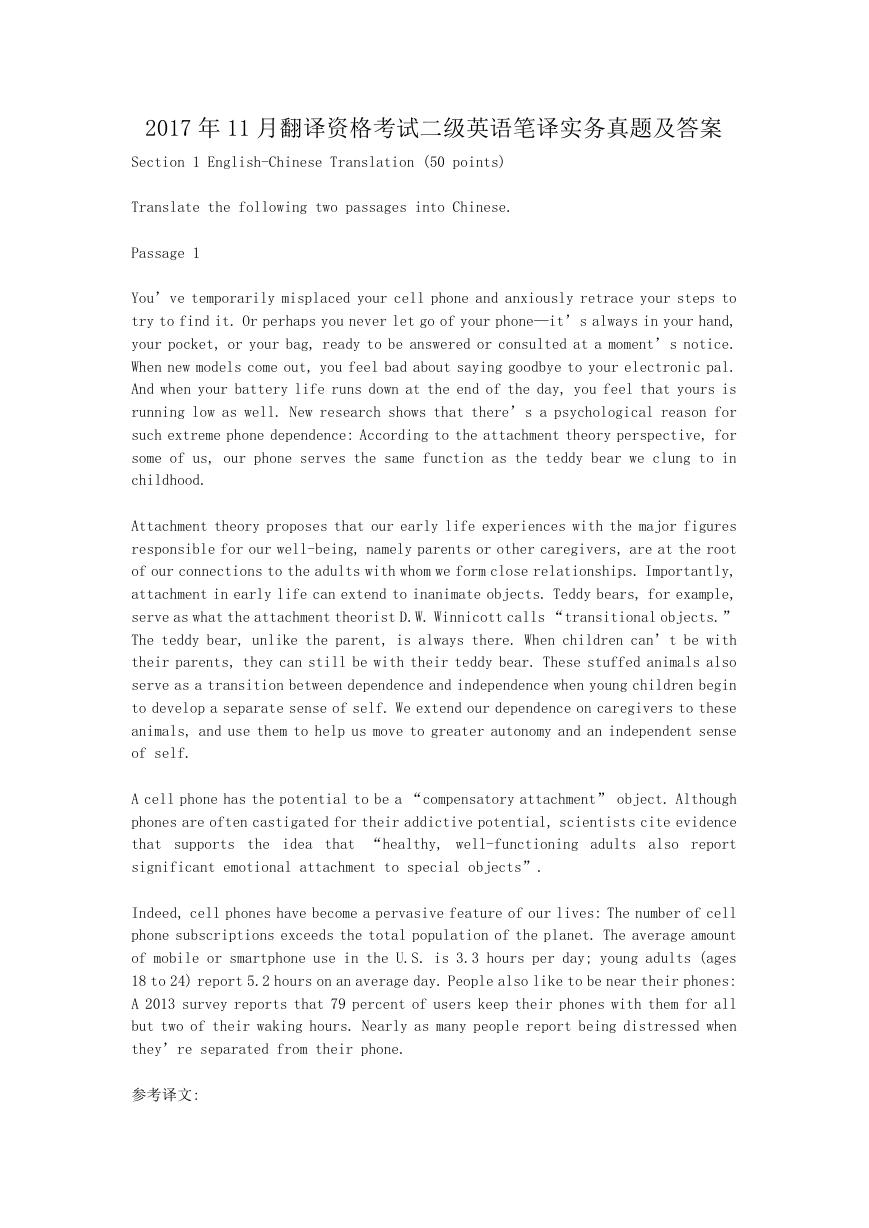
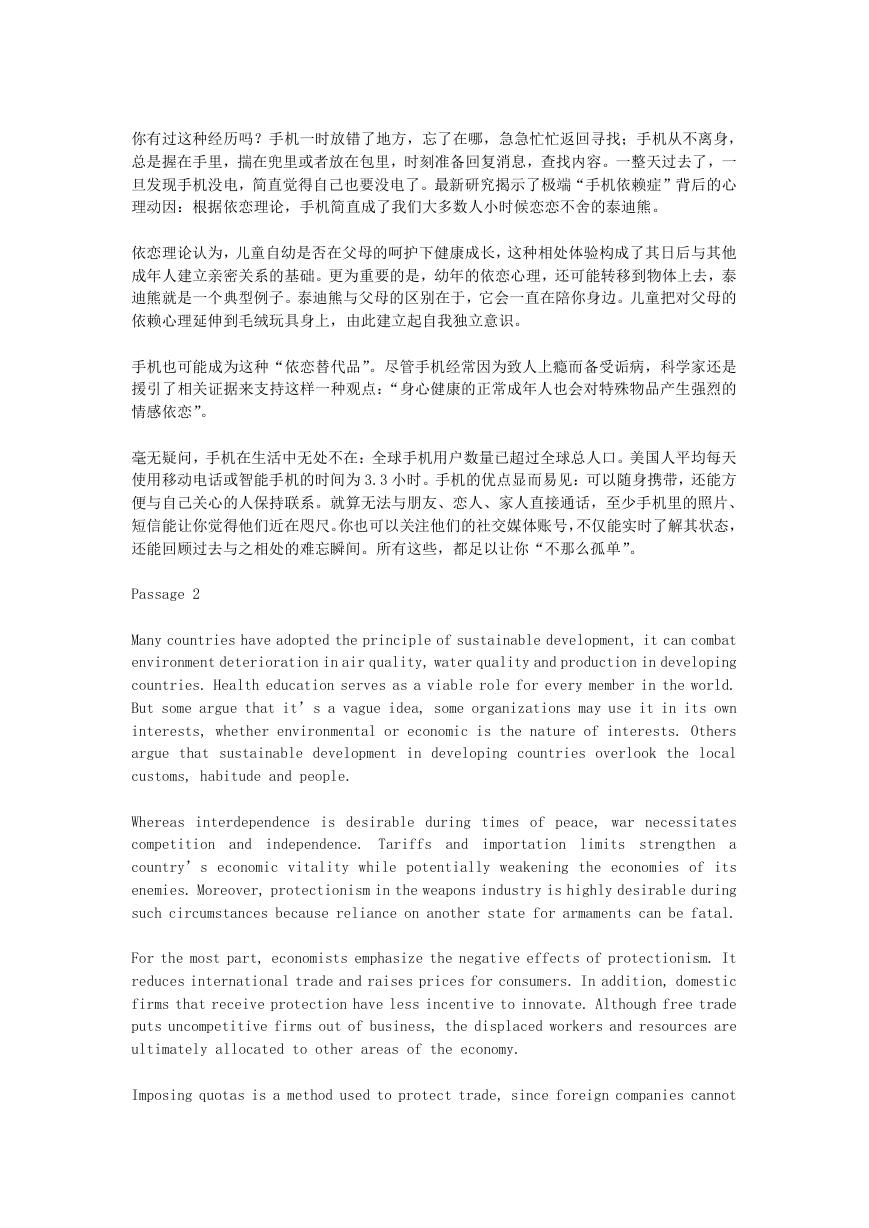
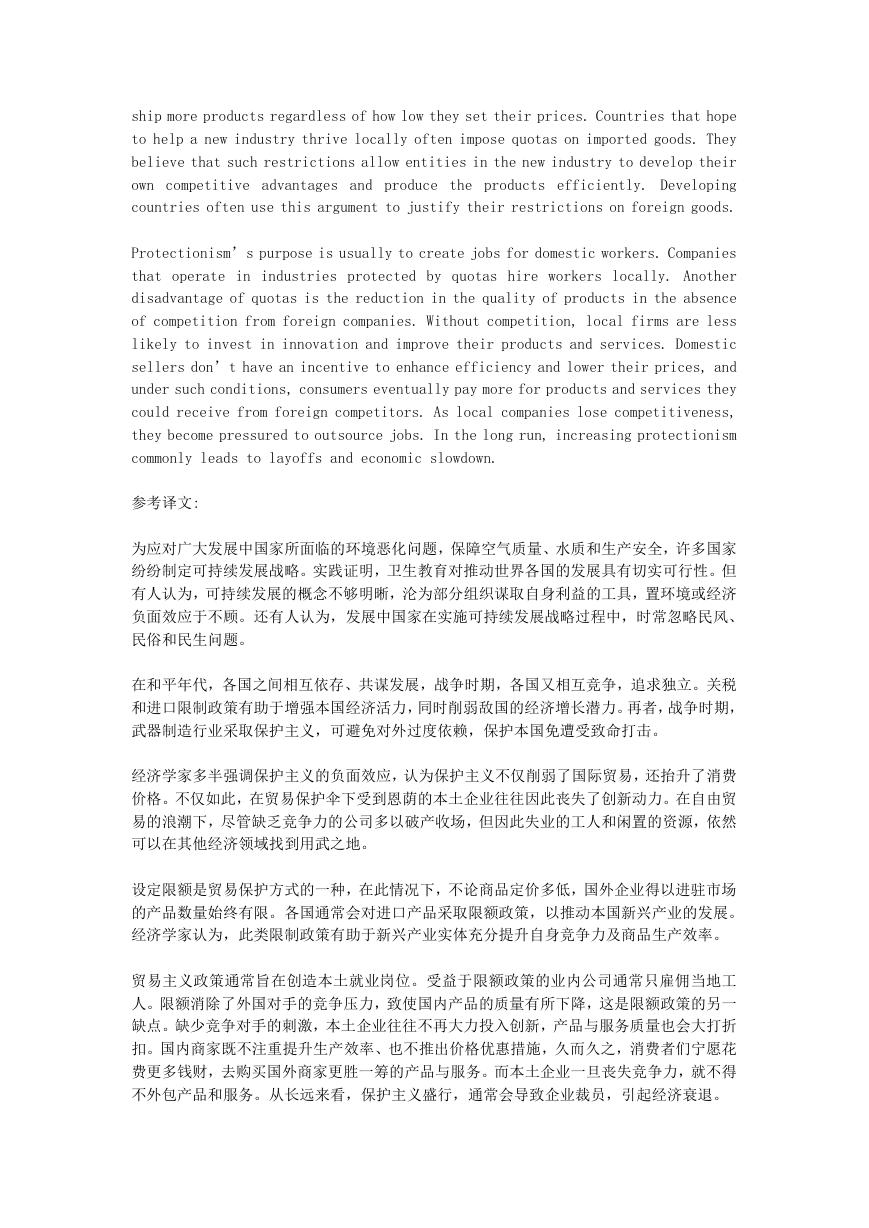
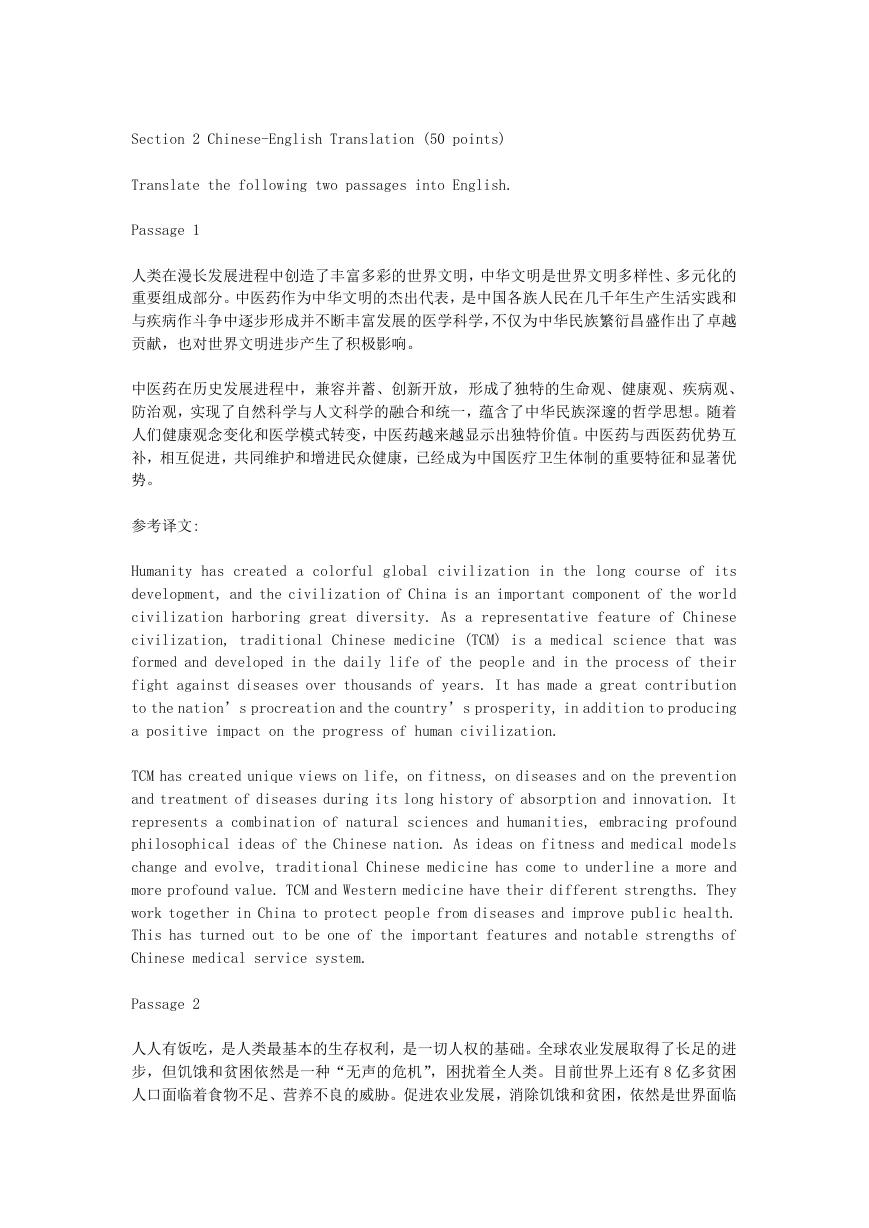
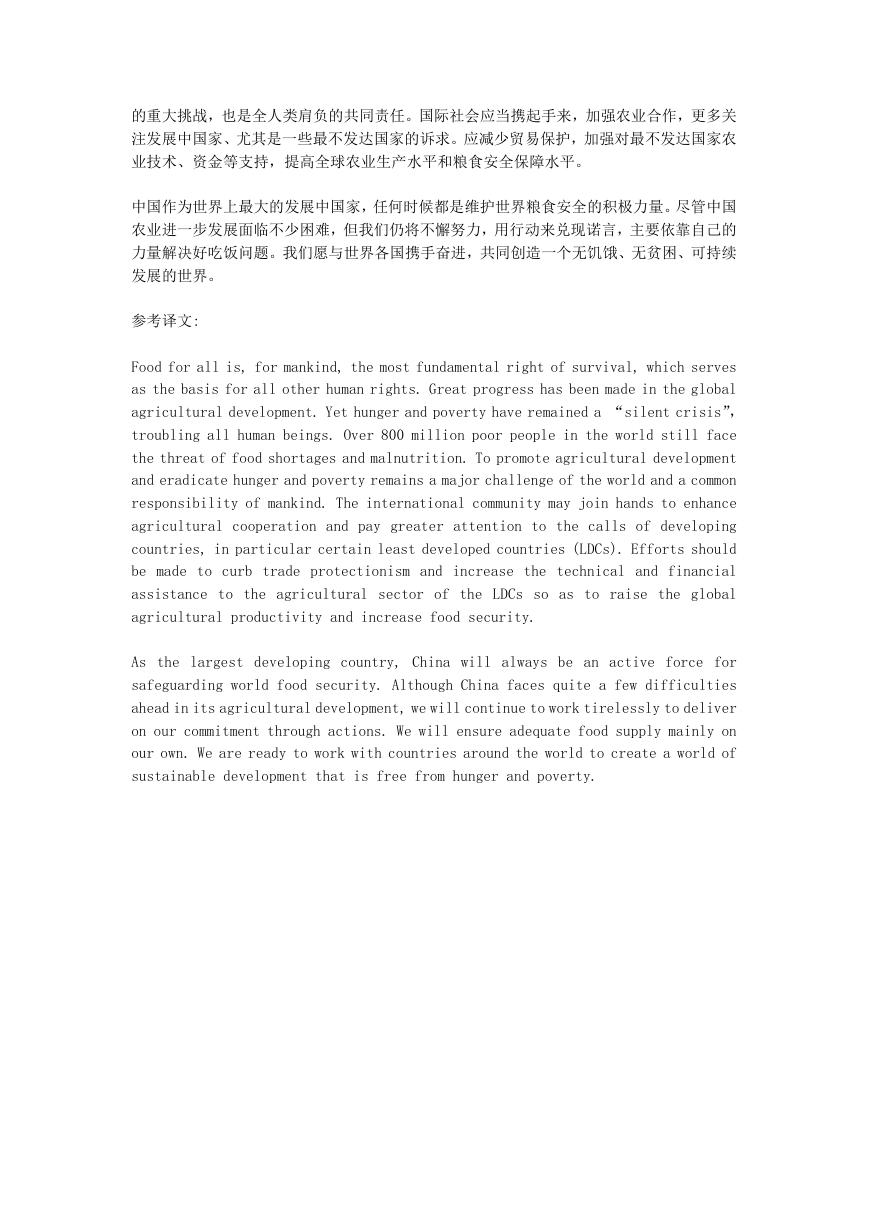





 2023年江西萍乡中考道德与法治真题及答案.doc
2023年江西萍乡中考道德与法治真题及答案.doc 2012年重庆南川中考生物真题及答案.doc
2012年重庆南川中考生物真题及答案.doc 2013年江西师范大学地理学综合及文艺理论基础考研真题.doc
2013年江西师范大学地理学综合及文艺理论基础考研真题.doc 2020年四川甘孜小升初语文真题及答案I卷.doc
2020年四川甘孜小升初语文真题及答案I卷.doc 2020年注册岩土工程师专业基础考试真题及答案.doc
2020年注册岩土工程师专业基础考试真题及答案.doc 2023-2024学年福建省厦门市九年级上学期数学月考试题及答案.doc
2023-2024学年福建省厦门市九年级上学期数学月考试题及答案.doc 2021-2022学年辽宁省沈阳市大东区九年级上学期语文期末试题及答案.doc
2021-2022学年辽宁省沈阳市大东区九年级上学期语文期末试题及答案.doc 2022-2023学年北京东城区初三第一学期物理期末试卷及答案.doc
2022-2023学年北京东城区初三第一学期物理期末试卷及答案.doc 2018上半年江西教师资格初中地理学科知识与教学能力真题及答案.doc
2018上半年江西教师资格初中地理学科知识与教学能力真题及答案.doc 2012年河北国家公务员申论考试真题及答案-省级.doc
2012年河北国家公务员申论考试真题及答案-省级.doc 2020-2021学年江苏省扬州市江都区邵樊片九年级上学期数学第一次质量检测试题及答案.doc
2020-2021学年江苏省扬州市江都区邵樊片九年级上学期数学第一次质量检测试题及答案.doc 2022下半年黑龙江教师资格证中学综合素质真题及答案.doc
2022下半年黑龙江教师资格证中学综合素质真题及答案.doc